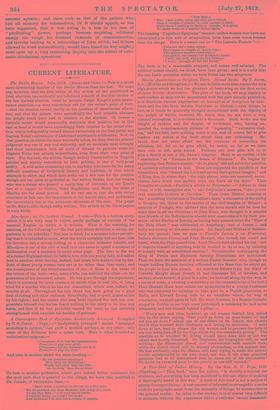Secular Annotations on Scripture Texts. Second Series. By F. Jacox,
B.A. (Hodder and Stoughton.)—We can do little more than repeat the very high praise which we had the pleasure of bestowing on the first series of these Secular Annotations. The plan of the book, we may explain to such readers as may not be acquainted with the part already published, is to illustrate various expressions or narratives of Scripture by anec- dotes and the like from secular literature or history,—such things, in fact, as it would be generally thought inconsistent with the dignity of the pulpit, of which, however, Mr. Jacos has, wo are sure, a very rational conception, to introduce into a discourse. Such books are the delight of readers and the despair of reviewers, who, having ex- hausted the complimentary phrases of "ingenuity," "extensive read- ing," and the like, have nothing more to say, and of course fail to give readers any notion of the book which they are criticising. Mr. Jacox does not even afford one the resource of correcting his mistakes, for, far as he goes afield, he never, as far as we have been able to tell, goes astray. Perhaps our best plan will be to give a sketch of one of Mr. Jacox's chapters. Here is an outline of his "annotation" on "Naaman in the house of Rimmon." He begins by explaining that Elisha's answer, "Go in peace," did not solve the question of casuistry submitted to him. Then are suggested the parallels of the Samaritans, who "feared the Lord and served their graven images ;" and of King Asa, in whose days "the high places were not removed, never theless Asa's heart was perfect with the Lord all his days." Then Corneille is quoted,—Pauline's advice to Polyeacte :—" Adorez-le dans ramie, et n'en temoigniez rien " ; and Polyencte's answers, "Quo je sois tont ensemble idolatre et Chrdtien." Then come Gibbon sneering at the " trembling Christians of Tertullian's days," a discussion of the policy of Gregory the Great in the matter of the idol-temples of Britain ; a mention of Zwingle, who advised that the mass should still be read for some time in all the churches ; of John Knox, who thought it a scandal that friends of the Reformation should ever countenance it by their pre- sence ; of the Elector of Saxony, as having been present when the "Mass of the Holy Ghost " was celebrated at Augsburg ; and of James I. and Sully conversing on the same subject. Dr. Smith and Hobbes of Malmes- bury are quoted ; then we pass to Pascal's Lettres a un Provincial, Defoo'a Robinson Crusoe, and John Howard, who bowed, but would not kneel, when the Pope passed him. Lord Chesterfield advised his son " not to deprive himself of anything that he wanted to do or see, by refusing to comply with an established custom." Themistocles worshipping the King of Persia and Napoleon turning Massulman are mentioned. Then we have the anecdote of a certain Pastor Gossner, who, though no longer holding Roman doctrine, officiated at the Maas that he might get the people to hear him preach. An anecdote follows from the diary of Cornelia Knight about Joseph IL and Gustavus III. of Sweden, and another, about herself, is given in a note (we have all along, by the way, in a series of notes, a running commentary on the commentaries of the text.) Then Hannah More here enlists our sympathies for a young lieutenant who was cashiered for refusing to take part in a Popish procession at Malta, and Edward Irving tells us an anecdote which, by way of conclusion, we shall quote in fall. He went, it seems, to a Roman Catholic chapel in Dublin to see high mass performed, a ceremony he had never witnessed, and hid himself behind a pillar — " Every now and then, however, an old woman behind him pulled him by the skirts, saying, Sure you'll go down on your knees.'—' And did you go down ? ' asked one of the elders of St. John's, the church which then counted both Chalmers and Irving its ministers. I went down at last, both to please the old woman and to prevent the tails of my coat being torn off by the tugs which she was constantly giving.' The question as to whether Mr. Irving should have done this or not was raised and keenly discussed. Dr. Chalmers, his biographer tells us, said nothing ; the discussion closed, and conversation took another turn, while the doctor stood still in dreamy abstraction, as his manner was. He was evidently, says Dr. Hanna, still busy trying to settle the qutestia vexata satisfactorily to his own mind, nor was it till some practical question had to he determined that he came out of his abstraction! No doubt he recurred anon to the gum...silo as one still veranda."


































 Previous page
Previous page